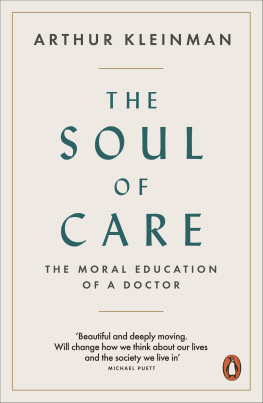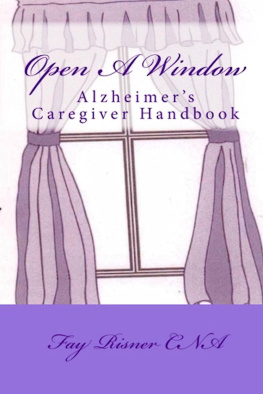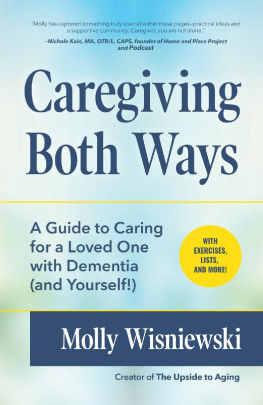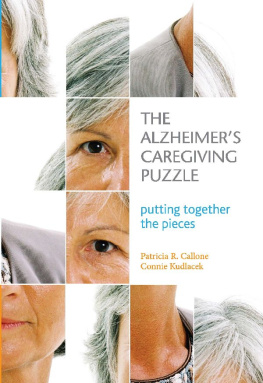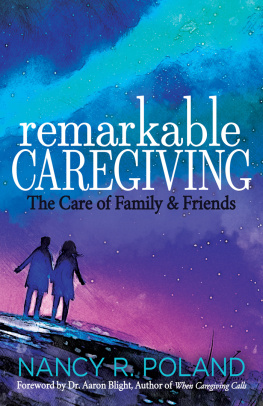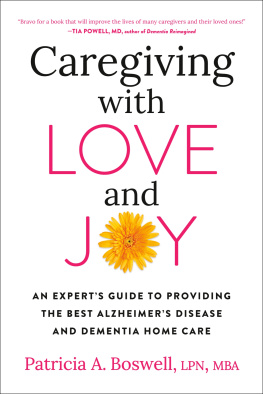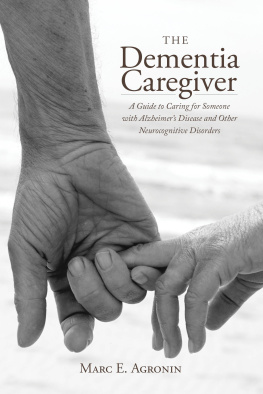Arthur Kleinman
THE SOUL OF CARE
The Moral Education of a Doctor

PENGUIN BOOKS
THE SOUL OF CARE
Deeply affecting a testament to the human capacity to draw sustenance from the memories of love, even as those memories are disappearing in the person loved. It is an important book Kay Redfield Jamison, author of An Unquiet Mind
A detailed account of his decade as a caregiver for his wife, who was diagnosed with early-onset Alzheimers a poignant memoir that will be useful to caregivers of all ages and occupations Kirkus Reviews
[Kleinman] reminds us of the moral responsibility to provide care and describes care as the human glue which binds together families and communities. Beyond this connection, he contends that individual caregivers can discover purpose, revelation, and gratification in tending to others. Much more than a sad story about suffering, loss, and an inevitably downhill disease, Kleinmans graceful narrative provides the sort of tonic that society sorely needs Booklist
The Soul of Care will leave you shaken but instructed, with an ethical imperative and hopeful lessons regarding how best to cultivate ones humanity over the course of a lifetime Paul Farmer, MD Harvard Medical School
Heartfelt, beautifully written, incredibly moving, and so instructive This story will stay with me Abraham Verghese
An astute, affecting memoir, candid and prescriptive in equal measure Stacy Schiff, Pulitzer Prize-winning author
A poetic, moving, generous, and courageous account. You cannot possibly leave these pages unchanged in your understanding of what real caring means Don Berwick, Institute for Healthcare Improvement
At once a manifesto for decent health care and a brave exposing of an inner life, The Soul of Care gives language for what we all crave effective, generous health care that nourishes those who give and those who receive until they recognize their oneness Rita Charon, Columbia Narrative Medicine
A rich account of care as presence, immediacy and attention that should matter to our medical system. But above all it is a love story of great pain, but also of joy. It is about what really matters in our lives T. M. Luhrmann, author of Of Two Minds: An Anthropologist Looks at American Psychiatry
Arthur Kleinmans very human story is an inspiration for all of us Lee Goldman, Dean of Columbia University School of Medicine
What was at stake for Arthur in his caring for Joan was nothing short of his humanity. Read this book and prepare to be both humbled and inspired Jim Yong Kim, Former President of the World Bank
One of our nations most humane doctors and profound thinkers has insightful, moving, and novel things to say about our capacity to give and get care. Powerful, intimate, poignant, and helpful Nicholas A. Christakis, author of Blueprint: The Evolutionary Origins of a Good Society
A love story for the ages, a moral treatise, and a devastating critique of the absence of care in modern institutions and relationships Tahmima Anam, author of The Bones of Grace
To
JOAN ANDREA RYMAN KLEINMAN,
September 4, 1939March 6, 2011,
and to all those who loved her, who were her caregivers,
and who were, like me, created afresh by her love.

The space we stood around had been emptied into us to keep
SEAMUS HEANEY

And to all those who have experienced, withstood, and succumbed to suffering and disablementteaching us what it means to be human and why life (and death) matter. And to those carers who have given what they have, and done what they could, to sustain life and hope and to help create an adequate end, all the time recognizing it never was enough, even when it was all they had to give.
Note to the Reader
Information contained in this book accurately conveys the spirit of my work as a physician, an anthropologist, and a family caregiver. With the exception of autobiographical details, family members, and primary care physicians and hospitals who took care of Joan Kleinman, all names and identifying details in the case histories have been changed. This is meant to ensure confidentiality and to protect the anonymity of the individuals, families, and institutions involved. When I have made such changes, I have drawn on information from other patients, research subjects, and physicians facing similar problems to make the alteration valid in the light of the experiences of people I have treated, studied, and worked with.

Prologue
Get out! Get out!
My wife, Joan, is screaming, and hitting out wildly at the stranger in her bed. She is greatly agitated and frightened. Get away from here. Get out!
But the man she perceives as a stranger is me, her husband of more than forty years. Joan has just woken up from a midday nap. It is summer 2009 in Cambridge, Massachusetts. We are in the bedroom of the home we have lived in for twenty-seven years.
I try to keep my voice calm and hide the panic rising inside me. Im your husband, Arthur. Dont be so upset, Im here with you!
You are not! You are not Arthur! You are an impostor! Get out! Now! she yells, shaking and intensely alert, like a trapped animal.
I try in all the ways I can think of to calm her and to prove to her that I am indeed her husband, but she insists, denying who I am, growing more and more adamant, more and more upset. I begin to wonder if this is real or if I have woken up in a nightmare. Joan feels only terror, caught in the grip of a delusion that frightens her to the core. This has happened once before, in a hotel in Amsterdam the previous year, but still I feel totally unprepared to deal with her delirium.
Joan is almost blind and suffers dementia as a result of an atypical kind of early-onset Alzheimers disease. This excruciating episode is a classic manifestation of Capgras syndrome, a delusional state that occurs sometimes in people suffering neurodegenerative disorders. The affected person systematically misperceives those close to her and even the physical space she is occupying as unreal and fake. As in Joans case, it most often is episodic, short-lived, and readily forgotten, but for those close to the sufferer, it can be world-shatteringas if a bond that has taken decades to forge can be broken in an instant.
Im a trained psychiatrist. I should have the tools to deal with this. But right now, in this moment, I am a shocked and devastated husband. This episode, like the first, lasts a few terrible hours. During that time, I have to retreat to another part of our house, and wait until it burns itself out and she has returned to a calm state. I am also, however, a caregiverJoans primary caregiver. Several times I try to engage her in normal conversation, but she rejects me. Finally, I make believe I am someone else, there to help her.
Well, get rid of this impostor and find my real husband, she implores.


